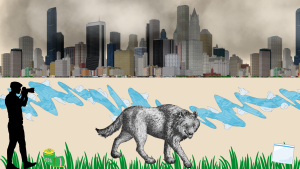
The Rollins Sustainability Program’s Swap N Shop event this semester promotes a circular fashion economy in our campus community.
Fast fashion is a socially and ecologically destructive practice that can be difficult to avoid. Cultivating and processing materials, chiefly cotton, often comes with wildly unjust child labor practices and factory work violations that cost the lives of powerless and voiceless workers toiling under inhumane conditions. Discarded textiles, rubber, and leather account for 9% of American municipal waste, translating to a figure of 81 pounds per person annually.
Buying used clothing and donating the clothes that you no longer want to local thrift stores like Avalon Exchange or Out of the Closet is an easy way to participate in a circular economy. Most clothing is also recyclable; however, clothing made from just one material is easier to recycle. USAgain and American Textile Recycling Service operate donation bins for recycling clothing. Larger thrift stores also sell clothing that they cannot use to recycling companies.
Eventually clothes become worn and unusable. The problem is that most clothes are made from plastics, having some amount of polyester, nylon, spandex, or acrylic in them, and these only break down into microplastics if not recycled. Sustainable textiles lower environmental impact because they are biodegradable or grown organically. Some materials are familiar, such as recycled cotton, and others are much more innovative: Reishi leather substitutes derived from mycelium, Tencel cellulose fiber from wood pulp as an alternative to polyester, ECONYL recycled nylon yarn, Bananatex fabric made from banana plants, and other agricultural byproduct-derived fabrics. Unfortunately, clothes in landfills release methane and contribute to greenhouse emissions while decomposing, so donating and recycling are preferable options for unwanted clothes.
If you’re looking to participate in a circular fashion economy at Rollins, donate freshly laundered clothes to a donation box. Swap N Shop donation boxes will be out until March 10, and the event will take place March 23. Locations for donation boxes will be posted on our Instagram (@rollinssustainability), and Swap N Shop ticket sales will be announced via email. Tickets are $7 and allow you to pick out as many items as you’d like from the event.
The opinions on this page do not necessarily reflect those of The Sandspur or Rollins College. Have any additional tips or opinions? Send us your response. We want to hear your voice.












Comments are closed.